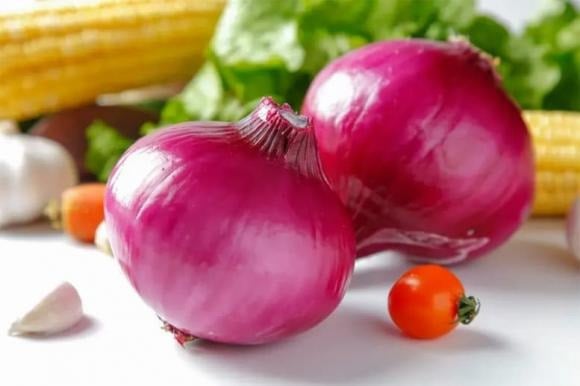Health Benefits of Onions
Onions are nutrient-dense, offering a plethora of health benefits.
Cancer Prevention
Onions are a rich source of two important bioactive compounds: selenium and quercetin. Selenium boosts immunity and inhibits cancer cell growth. Quercetin, a potent antioxidant, weakens and starves cancer cells by blocking their nutrient supply pathways.
Research indicates that a regular onion-inclusive diet reduces the risk of stomach cancer by 25% and lowers mortality rates by 30%.

Digestive Health and Constipation Relief
Onions contain sulfur compounds that convert into hydrogen sulfide in the body, stimulating intestinal motility and aiding waste elimination. Additionally, their fiber and oligosaccharides feed beneficial bacteria, fostering a healthy gut environment and significantly alleviating constipation.
Blood Sugar Control
Onions contain compounds similar to tolbutamide, an anti-diabetic drug, enhancing cellular glucose utilization. Red onions, in particular, excel at helping regulate blood sugar. However, they are supplementary and cannot replace medication. A daily intake of 25-50g is advisable.
Osteoporosis Prevention
Onion’s phytoestrogen content, a plant-based estrogen, helps balance hormones and slow bone loss, thereby supporting bone and joint health.
Blood Pressure Management
Compounds in onions prevent blood clots and enhance blood flow, contributing to stable blood pressure and reduced cardiovascular complications. Onions are an ideal food choice for individuals with chronic conditions like hypertension, diabetes, and cardiovascular issues.
However, when incorporating onions into your diet, be mindful of their interactions with other foods to prevent digestive discomfort and ensure optimal nutrient absorption.
Considerations When Combining Onions with Other Foods
1. Onions and Seaweed: A Potential Stone-Forming Combination
Seaweed is rich in iodine and calcium, while onions contain oxalic acid. Together, these foods can form compounds that may lead to kidney or gallstones.
Individuals with a history of stone formation or sensitive stomachs should exercise caution when consuming these foods simultaneously. Consult a physician if unsure about this combination.

2. Onion and Honey: A Nauseating Mix
Although honey is nutrient-dense, combining it with onions may lead to adverse reactions. Certain compounds in onions can interact with enzymes and acids in honey, generating harmful substances.
This mixture may induce nausea and vomiting and, in severe cases, eye irritation. To avoid these effects, consume these foods several hours apart. Individuals with sensitive stomachs should exercise caution.
Tips for Onion Consumption
Onions are fiber-rich, but some individuals may experience gastric discomfort due to fermentation and gas production. If prone to these issues, consider reducing onion intake or consuming small amounts. Avoid onions if you cannot tolerate their spiciness.
To minimize eye irritation while cutting onions, soak them in water beforehand or cut them under running water to dilute the irritating gases. Alternatively, use frozen onions or wear protective eyewear when handling fresh ones.
“This Everyday Affordable Fruit Will Bring About 3 Wonderful Changes to Your Body When Eaten Right”
“The humble sponge gourd, or mướp, is a powerhouse of nutrition and a secret weapon in the fight against premature aging. With a plethora of health benefits, this fruit is a must-add to your diet if you want to maintain a youthful and healthy body. Discover the wonders of this fruit and unlock the secrets to a longer and healthier life in the article below.”





































